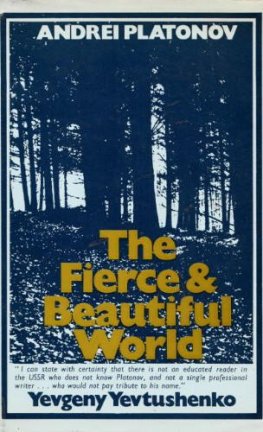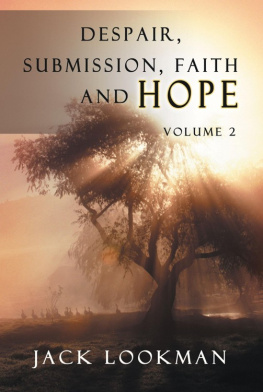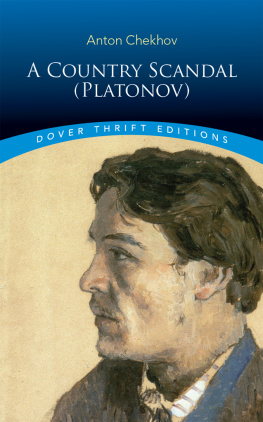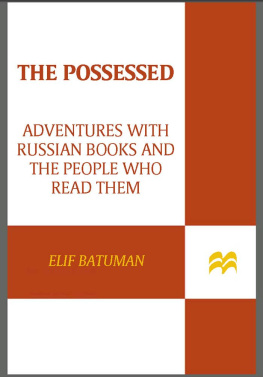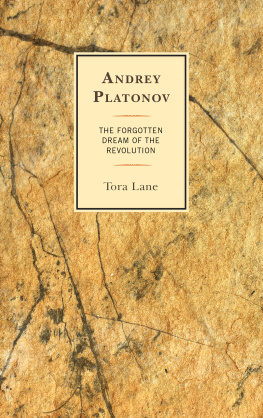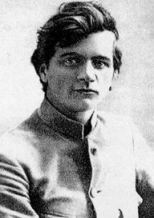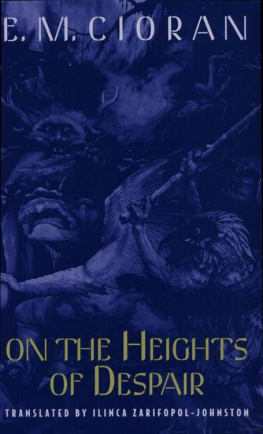CONTENTS
About the Book
People are on the move in all ten stories in this collection, coming home as in The Return, leaving home as in Rubbish Wind, travelling far away from their country as in The Locks of Epiphan, trying to improve their lives and those of others, running away, searching, fleeing. Their journeys are accompanied by two motives which characterize the writing of Andrey Platonov: optimism and faith in the goodness of humanity, and abject despair at the cruelty, randomness, and apparent senselessness of our existence. The protagonists are torn between these poles and sometimes a synthesis shines through the mists of the apparent naivety of faith and the blackness of despair: the hope against hope that a better life is still possible.
Though Russian readers and critics have come to look on Platonov as among their greatest prose writers of this century, he has yet to enjoy a parallel international reputation mainly because much of his best writing was suppressed for more than 60 years. Combining a realism inspired by his work as an engineer with poetic vision and the deceptively simple language of folk tales, Platonov sets his stories alight by using language in a way that renders it unfamiliar, makes the ordinary seem unusual and the extraordinary logical. This new translation is the first to present the full range of Platonovs gift as a short story writer to an English-language readership, showing why it is that Joseph Brodsky regarded Platonov as the equal of Joyce, Kafka and Proust.
About the Author
ANDREY PLATONOVITCH PLATONOV (18991951), the son of a railway-worker, was born near Voronzeh. He fought in the Red Army during the civil war, and then became an electrical engineer and land-reclamation specialist. From 1918 he published articles, verse and essays, passing from the optimistic vision of the pamphlet Electrification (1921), through a science-fiction trilogy, to the stories that began to appear, from 1926 on, in the thick Moscow journals. His talent was spotted early by Maxim Gorky, but after initial success, tales such as Doubting Makar (1929) and For Future Use (1931) were strongly criticized. Stalin is reputed to have written scum in the margin of the latter, and to have said to Fadeev (later to be Secretary of the Writes Union) Give him a good belting for future use. During the Great Patriotic War (19415) Palatonov worked as a war correspondent and once more began to receive some measure of official recognition. However, like Akhmatova and Zoshchenko, he came under attack again in the post-war clamp-down, and died of consumption caught from his teenage son whom he had nursed on his return from the Gulag in 1946. Although Platonovs stories began to be republished in the late 1950s, his major writings of the late 1920s and early 30s, including his two great novels, The Foundation Pit and Chevengur, remained unpublished in Russia until the late 1980s. When the KGBs literary archive was partially opened in the early 1990s, the draft of a previously unknown Platonov work, The Technical Novel, was discovered in his file.
ROBERT CHANDLER has translated a number of books from Russian, including Platonovs The Foundation Pit (co-translated with Geoffrey Smith), and Vasily Grossmans epic novel, Life and Fate.
ELIZABETH CHANDLER has over the years made an increasing contribution to her husbands translations.
ANGELA LIVINGSTONE has been a professor of Russian Literature at the University of Essex since 1992. She has published books on Pasternak and Lou Andreas-Salom, and is the translator of Marina Tsvetaevas essays on poetry.
Also by Andrey Platonov in English translation
THE FOUNDATION PIT
Andrey Platonov
THE RETURN
and Other Stories
Translated from the Russian by
Robert and Elizabeth Chandler
and Angela Livingstone
ACKNOWLEDGEMENTS
The Motherland of Electricity Izbrannye proizvedeniya (Khudozhestvennaya Literatura, Moscow, 1978)
The Epifan Locks Vzyskanie pogibshikh (Shkola Press, Moscow, 1995)
Rubbish Wind Vzyskanie pogibshikh (Shkola Press, Moscow, 1995)
Lobskaya Hill in: Novoe literaturnoe obozrenie No. 9 (1994) An earlier version of this English translation appeared first in Grand Street, No. 63 (1998) pp. 138145
The River Potudan Vzyskanie pogibshikh (Shkola Press, Moscow, 1995)
The Cow Vsya zhizn (Patriot Press, Moscow, 1991)
The Seventh Man Vsya zhizn (Patriot Press, Moscow, 1991) An earlier version of this English translation appeared in Partisan Review (Fall, 1998)
Nikita Vzyskanie pogibshikh (Shkola Press, Moscow, 1995) An earlier version of this English translation appeared in Glas, No. 16, (1998), pp. 2335
The Return Vzyskanie pogibshikh (Shkola Press, Moscow, 1995)
Two Crumbs in: Kostyor, No. 6 (1968)
INTRODUCTION
Andrey Platonovs father, Platon Klimentov, was a metal worker and a self-taught inventor. It was in homage to him and to the Greek philosopher alike that Andrey, as a young writer, adopted the pseudonym Platonov. The eldest of eleven children, Andrey began work at the age of fifteen, also as a metal-worker and assistant engine-driver. A passionate, even fanatical believer in the new world to be constructed by Science and Socialism, he began publishing poems and articles in the Voronezh press in 1918, at the same time as beginning his studies in the electrical science department of the railway polytechnic. Whether he took part in active fighting during the Civil War is not entirely clear; we know that at one point he was attached to the Red Army as a journalist and sent to Novokhopersk, where he witnessed six changes of power in the course of a month.
Shocked by the terrible drought and famine of 1921, Platonov abandoned literature for work in land reclamation. His reasons would have been understood by Tolstoy: being someone technically qualified, he wrote, I was unable to continue to engage in contemplative work such as literature. The first of the stories in this volume, The Motherland of Electricity, is clearly based on his own experiences during the following years. Two sides of the young Platonov the visionary poet and the practical engineer are embodied in the two main characters: Zharyonov, the village-soviet chairman who speaks and writes letters in verse, and the engineer-narrator. The heart of this compassionate and humorous story lies in the conversation between the old peasant woman and the narrator. He tells her there is no point in praying to God for rain. She agrees, surprisingly, and continues:
Youre right we cross ourselves in vain! What havent I prayed about? Ive prayed for my husband, Ive prayed for my children and not one of thems been spared, theyre all dead now. If I keep going, my dear, its from habit do you think I choose to live? My heart doesnt ask me, it breathes by itself, and my hands just the same it makes the sign of the cross by itself: Gods our curse. [... ] Dont think its just God we bow down to were frightened by the wind and by the ice beneath our feet, and by downpours, by drought, by our neighbours, by passers-by, and we cross ourselves before all of them! Do you think we pray out of love? There isnt anything left of us to love with!
After parting from this old woman the narrator says wryly: I decided to dedicate my life to her, because in youth it always seems that there is a great deal of life and that there will be enough of it to help every old woman.
* * *
The Motherland of Electricity, written in 1926, contains all the elements of the mature Platonov except tragedy. The next story, The Epifan Locks, is unremittingly doom-laden; the hero is aware, almost from the first pages, of impending disaster, but can do nothing to avert it. Platonovs change of tone most probably reflects a crisis he underwent during the years 192627. Repeated problems with the security organs and with his colleagues in Tambov, where he was director of the land-reclamation bureau, appear to have set off some profound disillusion, perhaps to have reawoken doubts that Platonov had suppressed since witnessing the violence of the Civil War. In any case Platonov left Tambov and returned to Moscow to pursue a vocation as a writer. And it was during the next four years that he was to write much of his most important and subversive work.
Next page


